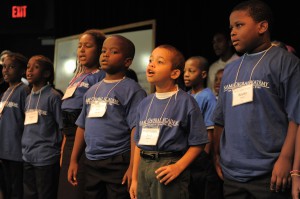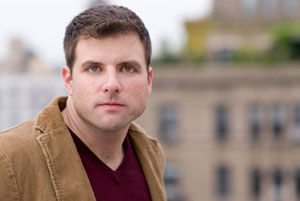
Miami Choral Academy tries to change lives through song
One day not too long from now, youth choral groups might be as ubiquitous and popular nationwide as Pop Warner football teams.
That’s the goal, in any case, of the Miami Choral Academy, whose director, Shawn Crouch, is working to develop a curriculum based on the academy’s work here that could be used by communities across the land.
“This is part of our mission, to really find the students that would not have these opportunities and say, ‘Look: We can help you,’” he said. “And we can change lives. Literally change lives.”
This weekend, the academy joins with the El Sistema Youth Orchestra, Children’s Orchestra and Choir in a Family Fest concert Saturday afternoon at the Knight Concert Hall. James Judd, the former Florida Philharmonic director who is artistic director of the Miami Music Project, will lead his orchestra in Beethoven’s Fifth Symphony, and bring the voices on stage for the Ode to Joy choral finale of Beethoven’s Ninth Symphony.
The concert is part of the Light/The Holocaust and Humanity Project, which promotes human rights through an emphasis on music and education.
The Choral Academy, which debuted in 2009 as an initiative of the Seraphic Fire concert choir, also takes its inspiration in part from El Sistéma, the widely admired Venezuelan youth music program that has renewed interest worldwide in music education as well as launched the careers of musicians such as Los Angeles Philharmonic director Gustavo Dudamel.
Shawn Crouch.
Crouch, 35, a Baltimorean who studied at the Peabody Conservatory’s youth prep program before going on to the Berklee College of Music and New England Conservatory in Boston, was good friends with Seraphic Fire founder Patrick Dupré Quigley when the two men were pursuing graduate study at Yale.
Crouch was a freelance composer for 10 years in New York and was teaching at Hunter College when Quigley asked him to come to Miami and help get an El Sistéma-like youth music program launched.
“We used to talk about the transformative power of music, that it has more than entertainment value, that it has more potential,” said Crouch, who added that he loved his Hunter College job and was on the tenure track. “But I was 31 at the time, and I saw the path, and it would be the same for the next 30 years. And I was looking for that next challenge.”
Crouch felt that he could safely leave New York and not harm his compositional career by coming to Miami, and said he’s had abundant commissions and performances since then (including a performance of his The Light of Common Day on Seraphic Fire’s 11th season opener earlier this month). And taking the Miami position meant he could focus on the other part of his musical life, which was “being a proponent of music in society, of finding new ways for music to survive in communities, and change communities, and in the school systems as well.”
If Venezuela could do it, the Academy’s founders reasoned, so could they.
“The big question was, ‘What do we want to do? Do we want to do a choral program or do we want to do an instrumental program?’” he said. “And for us, because we wanted to recreate this program as many times as possible, it just seemed more realistic to do this through choral singing.”
The academy operates at four Miami-Dade schools in economically disadvantaged communities – Citrus Grove, Natural Bridge and Lorah Park elementaries, and the Morningside K-8 Academy – and its honor choir gathers at the Church of St. Martha in Miami Shores. All told, the five choirs have around 250 children participating, Crouch said. (Performances can be found here.)
Children in the second, third and fourth grades at the participating schools are invited into the tuition-free program in the spring, as Crouch goes from class to class with a “roaming piano,” testing every kid in those grades on Happy Birthday, among other things.
“’Happy Birthday’ is a pretty revealing song. If you can nail the octave, you know something’s going on there,” he said. Usually, 90 to 100 new students are accepted into the program each year, he said.
And it’s not a program that’s just about learning to sing. It’s critical for its success that the children learn ear-training and how to read music as part of it.
“From day one as a violinist, you’re learning how to read music, you’re learning the kinesthetic and cognitive abilities to be able to put down a finger and tune a note, whereas singers so often are just taught, ‘Mimic what I’m doing,’ or they learn it by rote,” he said.
That wasn’t acceptable to Crouch and others, who wanted their program to be built on a solid musical grounding.
A Lorah Park student demonstrates her dictation skills.
“So we have a strong solfège program, and a music literacy program that really goes into music integration so that our students are really bridging the gap between reading, writing and math, and what we’re doing in the rehearsal hall. So a portion of every rehearsal, about 45 minutes to an hour, is music skills classes.”
Understanding notation is more than just learning the different between A and B on a staff.
“It’s in the reading that we unlock all those skills. It’s where we have decoding, it’s where we have to do interpretation. It’s where we not only have to see what’s written on the page, but what’s around us, to listen and to tune, to literally work in harmony with those around us,” he said. “So there’s team-building that happens, and there’s communication that happens, and it’s through the reading that we unlock these skills.”
The program has been generally well-received by parents in the communities, Crouch said, even if it’s taken some time. He tells about a fourth-grader named Hazel who is “off-the-charts smart,” excited about music, and now a member of the honor choir.
“Her father said, ‘You know, I was really going to take my child out of this school, because I didn’t think she was being challenged. But this program is giving her everything that she wants to stay involved in school. And we’re going to keep her here for another year, if not longer,’” Crouch said.
The Choral Academy choirs rehearse once a week after school (there are seven people on staff), and the honor choir also practices once a week. The Academy gives three big concerts a year, including this coming Saturday, and two big Academy festivals, one in the winter and the other in the spring, for all the kids in the program.
The students also occasionally do “run-out” concerts at other venues near the schools. “It’s kind of like a community sports team, where they become the center of attention for the community, and a point of pride,” he said.
Also, the Academy does “community building” sessions every Saturday in October at each school, with a morning rehearsal followed by a big potluck picnic. “The kids give a mini-performance, and it’s great because we get them when they’re fresh, and they haven’t had school all day. And it’s a chance for me to meet all the parents. It’s a lot of fun.”
In the end, it all comes down to the music. Crouch said the repertoire of the choirs varies widely, and includes folksong, spiritual, pop music and even Palestrina. It’s all the same to young kids, who haven’t yet built their personal musical preferences.
“If we’d started in high school, then we’d be fighting it a little bit more. But for a third-grader, for a 7- or 8-year-old, music’s music. It doesn’t matter what it is. ‘So what if I’m singing in Latin?’ It doesn’t even faze them,” he said. “It’s fun. It’s what they like to do. And all of a sudden they’re singing in three-part harmony. That little melody we learned, we’re now going to sing it in canon, and it sounds great.
“It’s an exciting moment. But the beauty of it is, when you have good repertoire, it kind of sells itself.”
Saturday’s concert is set for 1:30 p.m. at the Arsht Center. Admission is free. To reserve a pass, call 305-949-6722 or visit arshtcenter.org/light.
Recent Content
-
Artsarticle ·
-
Artsarticle ·
-
Artsarticle ·


